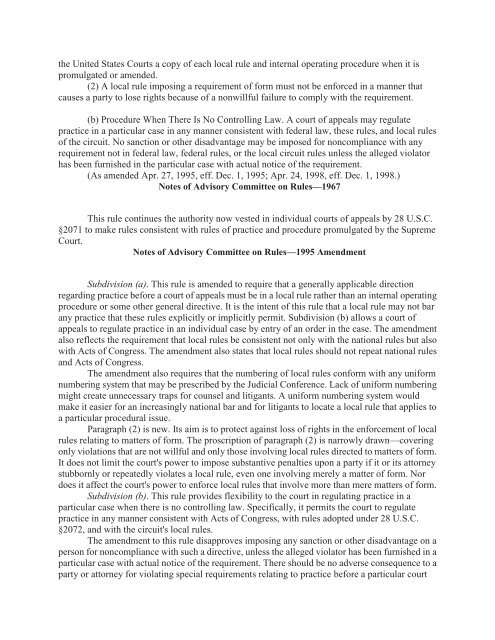Federal Rules of Appellate Procedure 2014-2015, 2014a
Federal Rules of Appellate Procedure 2014-2015, 2014a
Federal Rules of Appellate Procedure 2014-2015, 2014a
Create successful ePaper yourself
Turn your PDF publications into a flip-book with our unique Google optimized e-Paper software.
the United States Courts a copy <strong>of</strong> each local rule and internal operating procedure when it is<br />
promulgated or amended.<br />
(2) A local rule imposing a requirement <strong>of</strong> form must not be enforced in a manner that<br />
causes a party to lose rights because <strong>of</strong> a nonwillful failure to comply with the requirement.<br />
(b) <strong>Procedure</strong> When There Is No Controlling Law. A court <strong>of</strong> appeals may regulate<br />
practice in a particular case in any manner consistent with federal law, these rules, and local rules<br />
<strong>of</strong> the circuit. No sanction or other disadvantage may be imposed for noncompliance with any<br />
requirement not in federal law, federal rules, or the local circuit rules unless the alleged violator<br />
has been furnished in the particular case with actual notice <strong>of</strong> the requirement.<br />
(As amended Apr. 27, 1995, eff. Dec. 1, 1995; Apr. 24, 1998, eff. Dec. 1, 1998.)<br />
Notes <strong>of</strong> Advisory Committee on <strong>Rules</strong>—1967<br />
This rule continues the authority now vested in individual courts <strong>of</strong> appeals by 28 U.S.C.<br />
§2071 to make rules consistent with rules <strong>of</strong> practice and procedure promulgated by the Supreme<br />
Court.<br />
Notes <strong>of</strong> Advisory Committee on <strong>Rules</strong>—1995 Amendment<br />
Subdivision (a). This rule is amended to require that a generally applicable direction<br />
regarding practice before a court <strong>of</strong> appeals must be in a local rule rather than an internal operating<br />
procedure or some other general directive. It is the intent <strong>of</strong> this rule that a local rule may not bar<br />
any practice that these rules explicitly or implicitly permit. Subdivision (b) allows a court <strong>of</strong><br />
appeals to regulate practice in an individual case by entry <strong>of</strong> an order in the case. The amendment<br />
also reflects the requirement that local rules be consistent not only with the national rules but also<br />
with Acts <strong>of</strong> Congress. The amendment also states that local rules should not repeat national rules<br />
and Acts <strong>of</strong> Congress.<br />
The amendment also requires that the numbering <strong>of</strong> local rules conform with any uniform<br />
numbering system that may be prescribed by the Judicial Conference. Lack <strong>of</strong> uniform numbering<br />
might create unnecessary traps for counsel and litigants. A uniform numbering system would<br />
make it easier for an increasingly national bar and for litigants to locate a local rule that applies to<br />
a particular procedural issue.<br />
Paragraph (2) is new. Its aim is to protect against loss <strong>of</strong> rights in the enforcement <strong>of</strong> local<br />
rules relating to matters <strong>of</strong> form. The proscription <strong>of</strong> paragraph (2) is narrowly drawn—covering<br />
only violations that are not willful and only those involving local rules directed to matters <strong>of</strong> form.<br />
It does not limit the court's power to impose substantive penalties upon a party if it or its attorney<br />
stubbornly or repeatedly violates a local rule, even one involving merely a matter <strong>of</strong> form. Nor<br />
does it affect the court's power to enforce local rules that involve more than mere matters <strong>of</strong> form.<br />
Subdivision (b). This rule provides flexibility to the court in regulating practice in a<br />
particular case when there is no controlling law. Specifically, it permits the court to regulate<br />
practice in any manner consistent with Acts <strong>of</strong> Congress, with rules adopted under 28 U.S.C.<br />
§2072, and with the circuit's local rules.<br />
The amendment to this rule disapproves imposing any sanction or other disadvantage on a<br />
person for noncompliance with such a directive, unless the alleged violator has been furnished in a<br />
particular case with actual notice <strong>of</strong> the requirement. There should be no adverse consequence to a<br />
party or attorney for violating special requirements relating to practice before a particular court


















